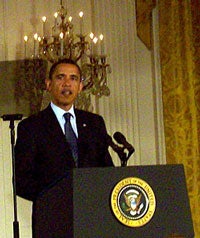 |
| President Barack Obama speaks about the nation’s cybersecurity at the White House on Friday. Photo: Kenneth Corbin |
WASHINGTON — President Obama today unveiled a broad-ranging plan to shore up the nation’s digital infrastructure, pledging to elevate cybersecurity on the national security agenda and establish an office in the White House to coordinate efforts across the various agencies.
“This new approach starts at the top with this commitment from me: From now on, our digital infrastructure, the networks and computers we depend on everyday will be treated as they should be — as a strategic national asset,” Obama said this morning in an address in the East Room of the White House. “Protecting this infrastructure will be a national security priority.”
Today’s address accompanied the release of the long-awaited cybersecurity review Obama commissioned in February. Among other things, the review highlighted the inefficiencies and shortcomings of the current cybersecurity apparatus. Obama vowed to streamline the agencies’ loosely organized efforts with a strong central office in the White House led by a new position of “cybersecurity coordinator.”
“No single official oversees cybersecurity policy across the federal government. No single agency has the responsibility or authority to match the scope and scale of the challenges,” Obama said. “Indeed, when it comes to cybersecurity, federal agencies have overlapping missions and don’t coordinate and communicate nearly as well as they should.”
Obama did not name the person he will tap to coordinate federal cybersecurity, but promised the position would have his full support, ample funding and direct access to the Oval Office.
The cybersecurity coordinator will be organized in the new National Security Staff Obama announced earlier this week. In addition, the cybersecurity coordinator will also serve on the president’s National Economic Council.
The position will work closely with the newly-created federal CTO and CIO roles, and also coordinate with the Office of Management and Budget to ensure that the agencies are devoting sufficient resources to cybersecurity in their budgets.
In his remarks this morning, Obama stressed the economic impact of cyber threats, touting the growth of e-commerce and the complete dependence of commercial transactions on interconnected communications and information networks.
“America’s economic prosperity in the 21st century will depend on cybersecurity,” he declared.
Obama Campaign Breached
In a speech warning of rampant identity theft, vulnerabilities in the nation’s electrical grid and military defense systems, and cyber attacks from terrorists, Obama also offered a personal anecdote about his own experience as a victim of cyber crime.
“It’s no secret that my campaign harnessed the Internet and technology to transform our politics,” Obama said. “What isn’t widely known is that during the general election, hackers managed to penetrate our computer systems.”
Between August and October, hackers gained access to scores of campaign materials, such as travel plans, policy papers and staff e-mails, he said.
Today’s report calls for an aggressive national campaign to educate the public about cyber threats and security, an initiative that Obama said would mesh with the other components of his Internet agenda, such as the commitment to expand access to broadband networks.
“It always takes time to actually trickle down to the citizens,” said TechGuard CEO Suzanne Magee, one of the many executives consulted for the administration’s review. “Now it will resonate if people understand that there is a call to arms,” Magee told InternetNews.com.
Obama described the report as laying a blueprint for the administration’s development of cybersecurity policy going forward, though he said that work is only beginning on a coordinated national strategy that will lean heavily on companies in the private sector.
He emphasized the need for public-private partnerships on equal footing, dismissing the idea of a heavy-handed regulatory framework for cybersecurity.
“The vast majority of our critical information infrastructure in the United States is owned and operated by the private sector,” he said. “My administration will not dictate security standards for private companies. On the contrary, we will collaborate with industry to find technology solutions that ensure our security and promote prosperity.”
Net Neutrality, Civil Liberties Pledged
He also mentioned the importance of protecting civil liberties and the openness of the Internet, explicitly reiterating his endorsement of the idea of Net neutrality.
Some digital-rights groups have raised concerns about the government impinging on citizens’ privacy in the name of cybersecurity. Those worries were renewed earlier this year with the introduction of the Cybersecurity Act, a sweeping piece of legislation that would, among other things, give the Commerce Department extralegal authority to bypass all existing privacy laws in the event of a cyber emergency.
In a joint statement, Sens. John Rockefeller, D-W.V., and Olympia Snowe, R-Maine, praised Obama for his leadership on cybersecurity, urging him to vest the new cyber czar with even more authority than the president indicated this morning.
“This advisor should report directly to the President on all cyber matters, ” they said. “There is no room for error, and no room for bureaucratic turf battles. We need to act now — the time to combat cyber terror was yesterday.”


